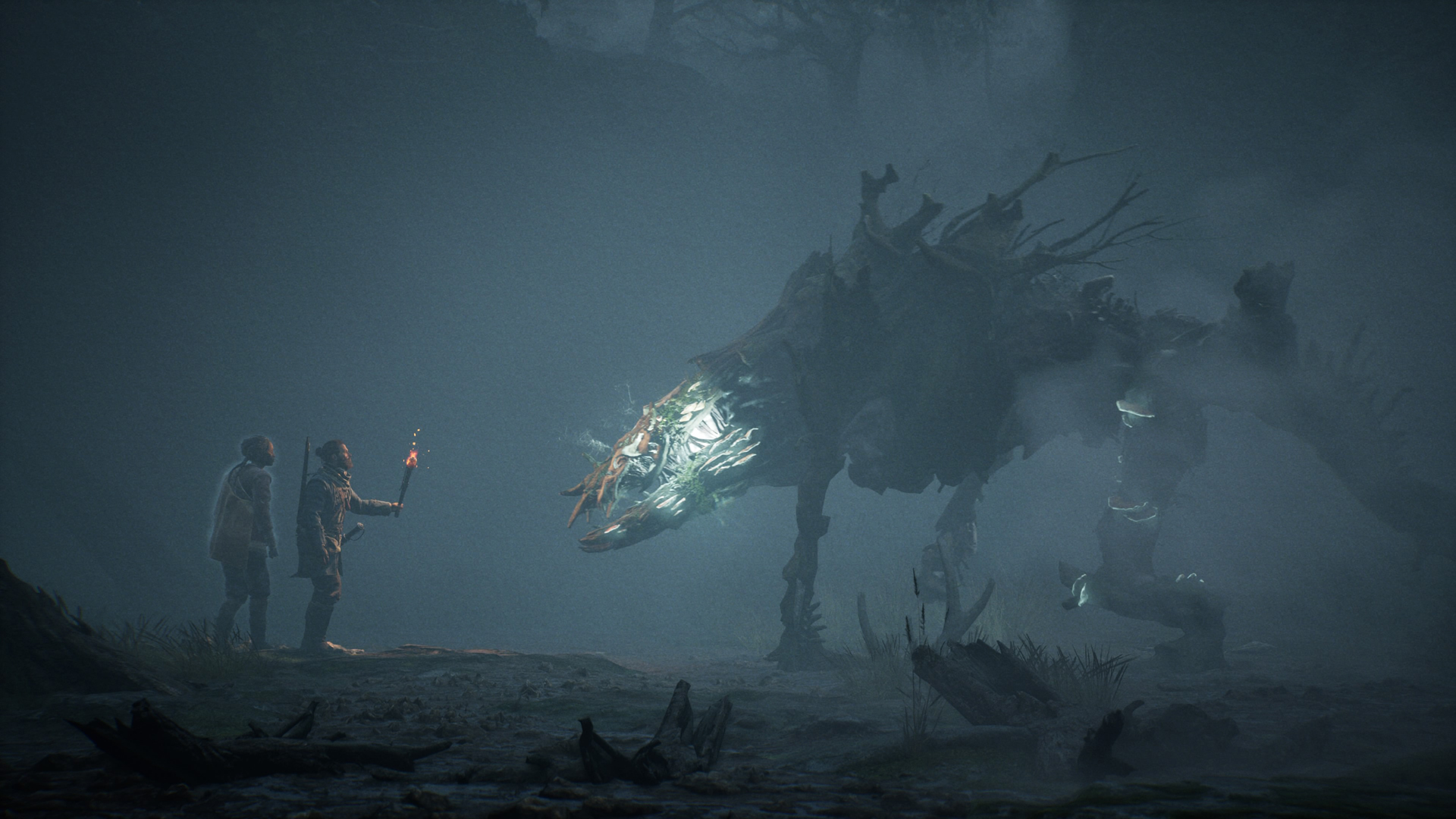
A specter is haunting Banishers: Ghosts of New Eden. If I had to put a name on it, I'd probably call it the ghost of third-person action adventures past. Developer Don't Nod's open-world spook mystery forges a clear identity in its characters and plotlines, but the body of the game is so possessed by the spirits of Assassin's Creed, Horizon: Zero Dawn, et al. that its unique voice often struggles to breach the surface.
Release date: February 13, 2024
Platform(s): PC, PS5, Xbox Series X
Developer: Don't Nod
Publisher: Focus Entertainment
It's no surprise that Don't Nod – best known for the Life Is Strange series – manages to spin a decent yarn, and indeed, despite some questionable choices, Banishers: Ghosts of New Eden's story is the best reason to see it through. The game's dual protagonists are the titular banishers, late 17th century ghostbusters who arrive in New England at the behest of a friend to help exorcize a particularly insidious presence. Cuban Antea Duarte is the experienced campaigner of the pair, with Scotsman Red McRaith her apprentice. But beyond this arrangement they're also lovers, which ensures a compelling strength and warmth to their bond.
Ghost with the Most
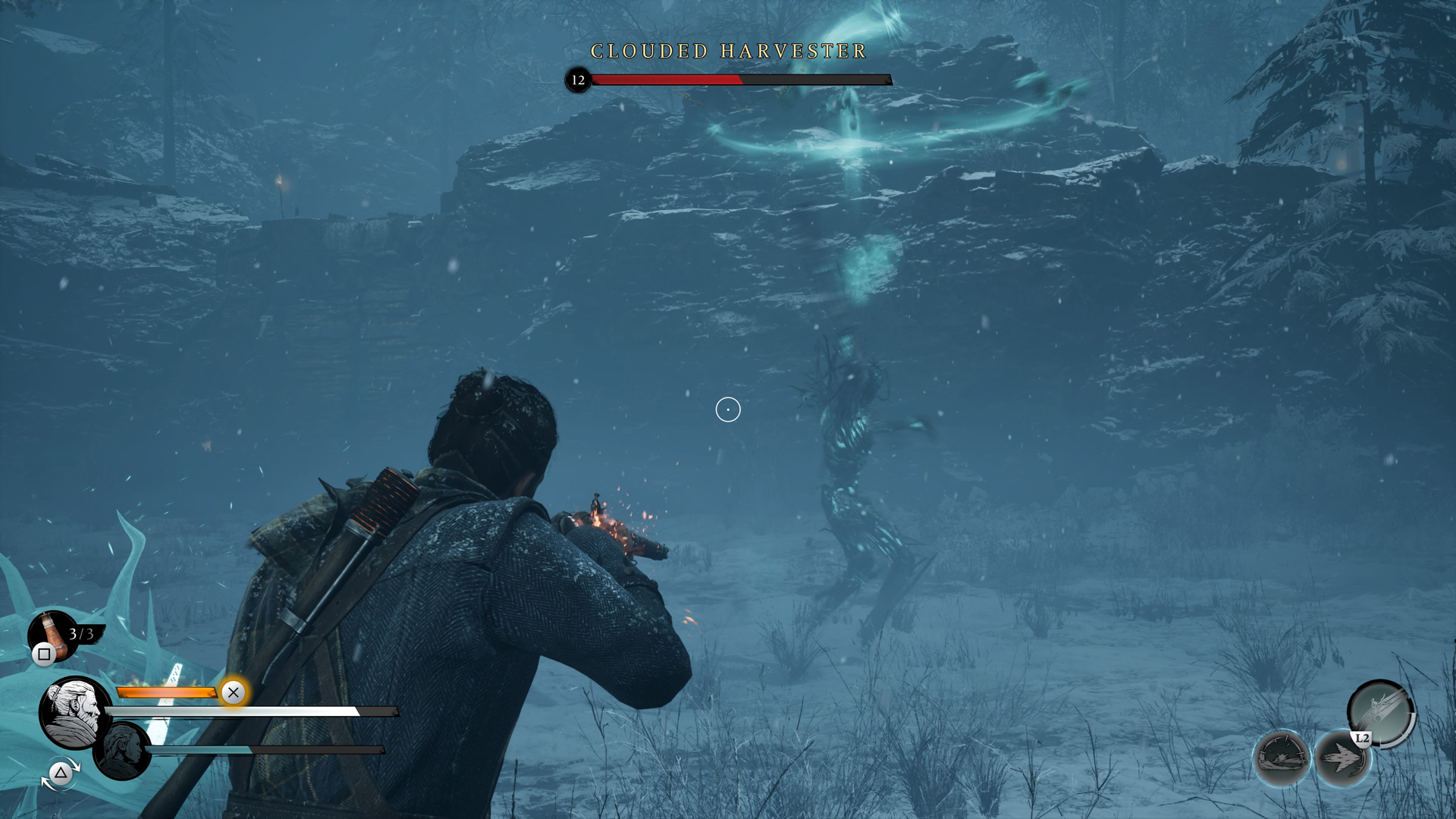
So compelling is it, in fact, that it's quite the comedown when this charming (and fine-looking) couple strike tragedy in Banishers: Ghosts of New Eden's well-advertised early plot turn. Antea gets bumped off by the malignant spirit causing all the trouble and spends the rest of the adventure as a ghost, aiding Red with spiritual powers as he embarks on a lengthy journey to find the root cause of the specter's wrath.
It's a hard swerve when it happens, and honestly I felt a little robbed at first. In part that's because the prospect of playing as the ghost hunting couple, splitting up to investigate different angles of the case, is full of promise in the opening stretch, and it's hard not to consider its potential. But also, Antea's death can feel more like a device made to fit some rather ordinary game design than a powerful piece of storytelling.
During bouts of exploration, Antea's presence – which you can switch to instantly – reveals traces of spiritual activity (think detective mode) or enables you to break certain barriers, while in combat she effectively adds an alternate fighting style. Story-based decisions, meanwhile, can lead to different endings for the partners, depending on whether you decide to banish ghosts haunting people who wronged them in life, or – somewhat drastically – sacrifice the still living perpetrators.
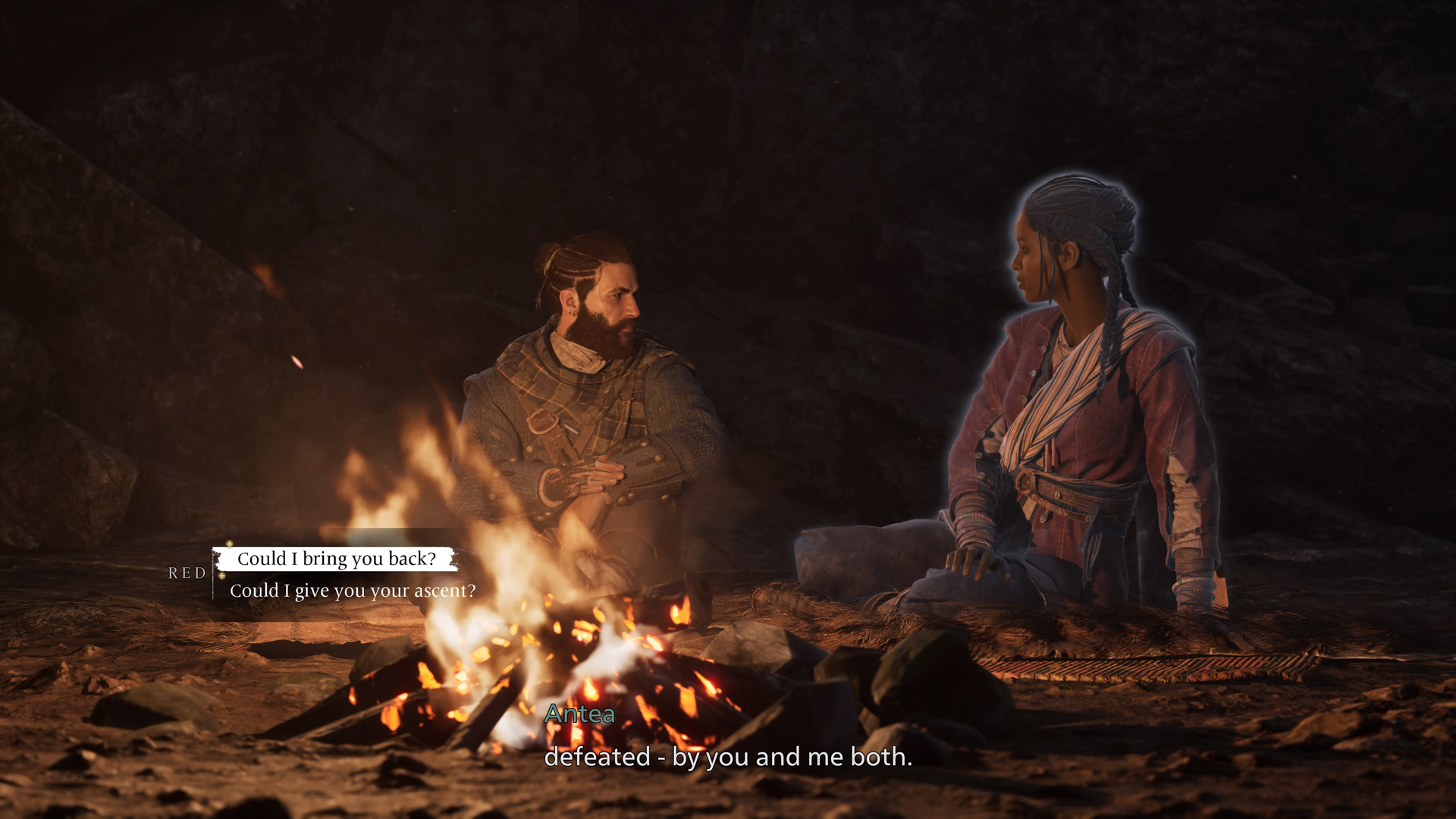
While this decision-making is set up as some thorny dilemma, however, it comes across more as a contrivance designed to fill a checkbox marked 'choices with consequences'. There's nothing in Banishers: Ghosts of New Eden's lore to suggest that banishers have authority to judge the living, let alone kill them, and the reasons why you might take this route (which you can probably guess) immediately seemed too morally compromised to seriously entertain.
Once I'd made my peace with the premise, though – and focused on banishing over sacrifice – I came to appreciate its poetic irony. As a haunted banisher, the more Red achieves to release the region from its curse, the closer he comes to the final goodbye, and the gravity of the situation is neatly conveyed by the duo’s characterisation. While working, they put a brave face on things, sharing quips and flirtatious jibes. When you rest at a camp between plot points, reality hits home in the quiet and the tone turns solemn, if not bitter. The prospect of completing the game is thus soured by conflicting feelings.
Mean Spirited
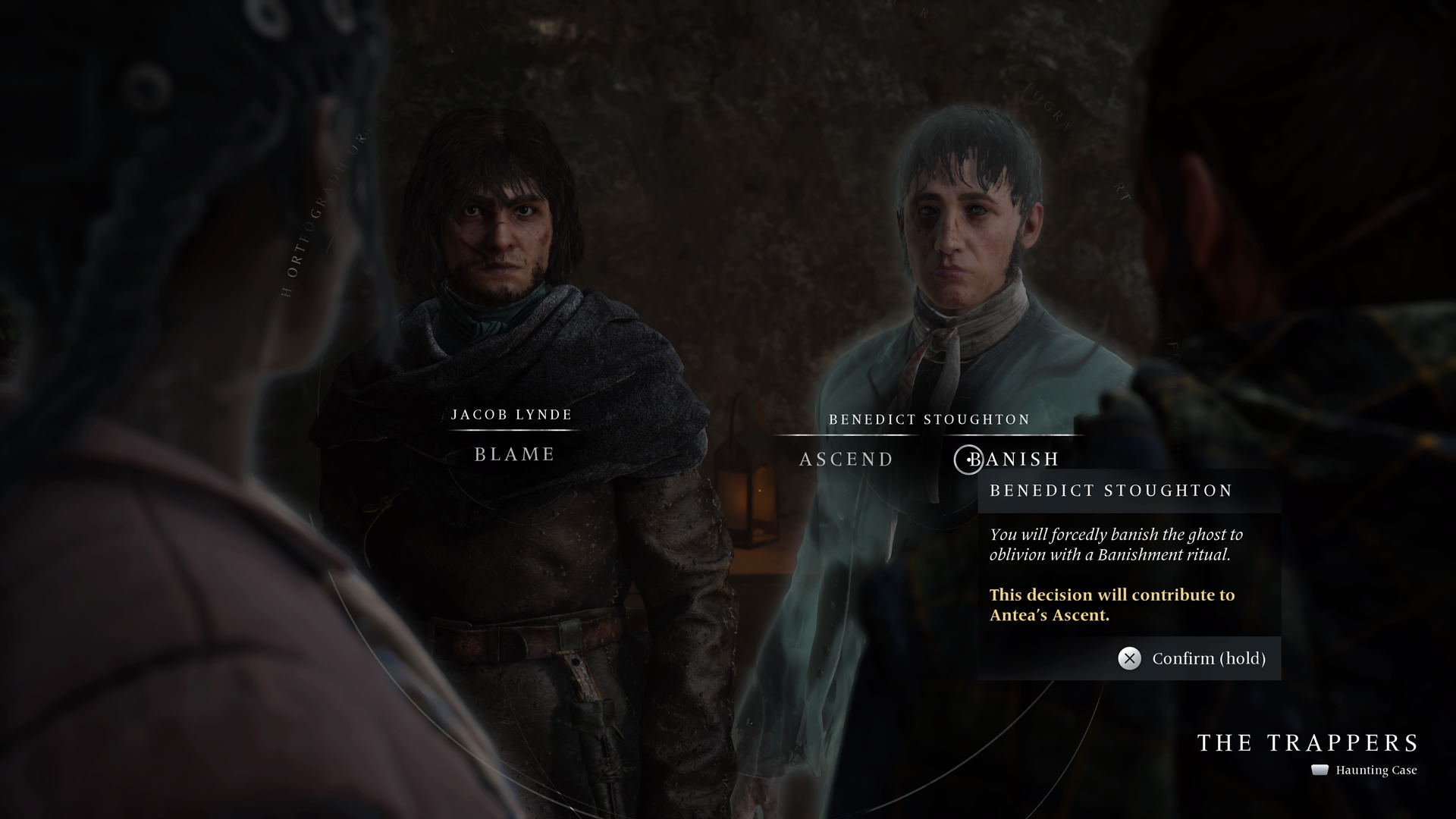
The lovers' tale isn't the only one worth sticking around for, either. Questlines in Banishers: Ghosts of New Eden comprise a series of haunting cases, divided across three main regions of the map. Plenty of people are being harassed by spirits, and you need to figure out the who and the why, tracking down evidence and items imbued with spiritual energy so you might make the ghost manifest, have a chat or a scrap with them, then decide how to proceed.
Some optional cases fail to do much with intriguing themes here, from cannibalism to domestic abuse, getting their toes wet but refusing to dive in. Core cases, however, are weighty and twisty, featuring antagonists who never descend into pure villainy, and often seem as pathetic as they are evil once their transgressions are revealed.
It helps that the puritan pilgrims in these parts come equipped with a fine range of British accents, and the script walks a line between period authenticity and contemporary accessibility. There's imagination and humor in some situations as well, best encapsulated up by Antea's summation of a possession case: "Ruth and Alexander are having an affair, in her husband's body."
Old Haunts

So it's a shame then that much of the impetus sparked by these plotlines is drained by the activities you have to perform. When it comes to how you solve these cases, this 20-hour-plus open-world sojourn is sadly quite unadventurous. Not only have you likely done almost everything there is to do here before in the likes of Assassin's Creed, Horizon, Ghosts of Tsushima, God of War, and more, Banishers: Ghosts of New Eden borrows the most mundane aspects of their design and asks you to repeat them dozens of times.
Often it feels as if you're following a kind of base genre template with the game's fascinating setting merely glued on top. Once you leave the confines of the cutscenes, the thick atmosphere, full of fearful tidings about "these dark times", stays behind. You charge about the land, stuffing your pockets with herbs, or barge into people's homes to read their correspondence and nick scraps of leather. Nests of spirits in the wild appear as glowing spots on the ground that you can just as easily ignore as provoke, and there's enough good old-fashioned gap squeezing and crab-walking across ledges to fill a trilogy. It's familiar in a way that especially rankles in a game about ghosts, because it destroys any sense of spookiness or the uncanny.
Combat, meanwhile, is sufficiently well-oiled, yet also familiar and repetitive. Near-identical mobs of specters and haunted corpses manifest here and there for you to extinguish in the same way you did last time, using Red for sword swipes, parries, and a slow-loading rifle shot, switching to Antea against enemies susceptible to spirit attacks and unleashing a small selection of cooldown-based specials. It works, but only in a few major boss encounters does it require genuine thought or effort, as if most fights are routine warm up exercises and training sessions.
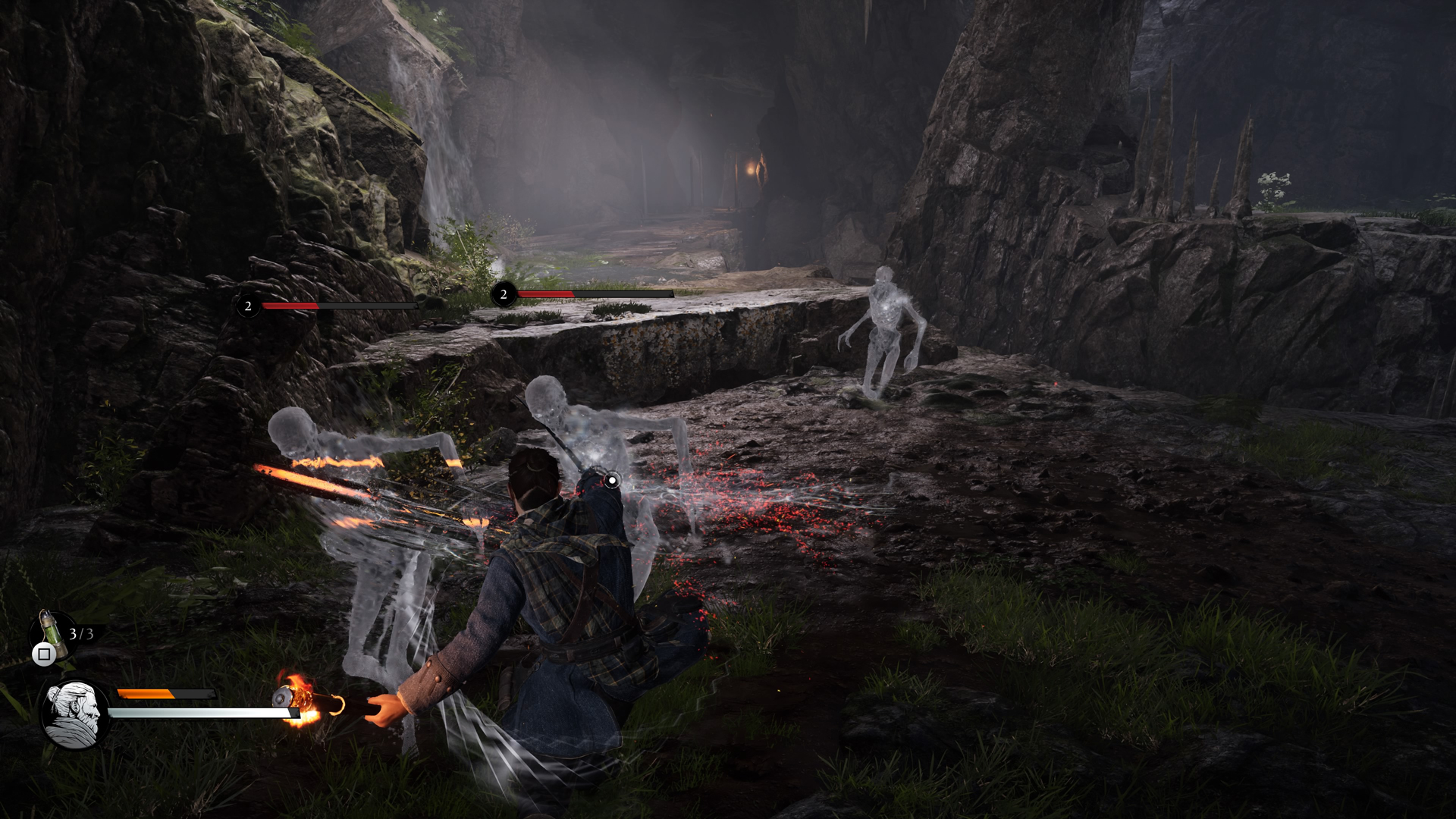
Continuing this trend, the Banishers: Ghosts of New Eden's RPG ambitions are sparse to the point of redundancy. Various perks are selectable when leveling up, or attached to equipment, but generally amount to percentage trade-offs on damage stats and cooldowns that don't exactly usher in distinct build types. In the later stages, it's hard to remember all the minor buffs and debuffs you're carrying into battle, let alone create a strategy around them.
Worse, perhaps, there simply isn't a lot worth discovering on Banishers: Ghosts of New Eden's expansive map. Locations open up gradually as you earn abilities that dismantle obstacles, but what lies behind is invariably drab. Countless times you jog over to a breakable wall, press a button to smash it, and find a dead end hosting nothing but a few more common crafting ingredients. In time, it's a pattern you repeat automatically, to make sure you'll have enough stuff to upgrade a piece of equipment later on, but none could claim it as anything other than arbitrary busywork – a point underlined when you find yourself upgrading a rifle with collected mushrooms.
The later stages of the game do sharpen the experience somewhat, at least. A full suite of powers gives you more to balance in combat, and some barriers require a modicum of acumen and skill to remove. But this isn't enough to stop Banishers: Ghosts of New Eden's from feeling leaden-paced. Its open world remains in the shadow of renowned predecessors, with few of the testing puzzles, fascinating landmarks or riveting combat situations that built their reputations. Having forged my way through to its ending, I doubt Banishers will haunt my thoughts for long.







